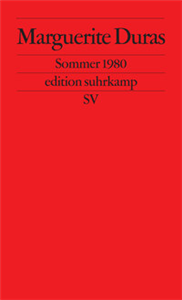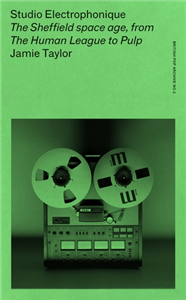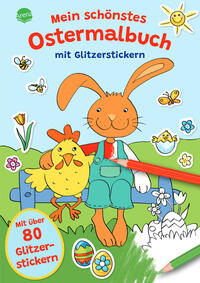Your Search Results
-
Promoted Content
-
Promoted ContentApril 1984
Sommer 1980
by Marguerite Duras, Ilma Rakusa
Zu Beginn des Summers 1980 wurde Marguerite Duras von der Pariser Tageszeitung Liberation gefragt, ob sie, während eines Jahres, eine Tageschronik für diese Zeitung schreiben wolle. Was schließlich zustande kam, war eine wöchentliche Chronik während dreier Monate: der Sommermonate des Jahres 1980. Die so entstandenen zehn »Berichte« Hilden den Inhalt des vorliegenden Buches: Marguerite Duras verbringt diesen Sommer in einem kleinen Haus am Atlantik. Die »große Welt« erreicht sie nur durchs Fernsehen, aber das Gesehene und Gehörte treibt sie um, zwingt sie zum Nachdenken, vermischt sich mit ihrem Alltag. Olympische Spiele in Moskau, Afghanistan, Begräbnis des Schahs von Persien in Ägypten, nach dem großen Streik in der Danziger Lenin-Werft.
-
 Trusted Partner
Lifestyle, Sport & LeisureJune 2024
Trusted Partner
Lifestyle, Sport & LeisureJune 2024Round our way
Sam Hanna's visual legacy
by Heather Nicholson
Sam Hanna (1903-96), a pioneering filmmaker from Burnley, Lancashire, was dubbed the 'Lowry of filmmaking' by BBC broadcaster Brian Redhead in the 1980s. The well-meant label stuck, even though it misses the variety of Hanna's remarkable output. Hanna's intimate glimpses into the lives of strangers enable us to imagine the possible stories that lie behind the images. Away from mid-century exponents of documentary filmmaking and photography, Hanna shows us humanity and a microcosm of a world in change, where his subjects are caught up in issues far beyond their grasp that we, as onlookers years later, encounter and see afresh. Written and curated by historian Heather Norris Nicholson, Round our way combines stills, essays and archive photography to document Hanna's unique visual record on film, particularly in northern England, but also further afield, during decades of profound change.
-
 Trusted Partner
Business, Economics & LawMay 2025
Trusted Partner
Business, Economics & LawMay 2025Steelworkers in struggle
An oral history of the 1980 national steel strike
by Charlie McGuire
Using oral histories gathered from trade unionists, this book explores the national steelworkers strike of 1980 and asserts its significance as a key turning point in modern British history. The strike was nominally a response to a 2% pay offer made by British Steel Corporation (BSC), at a time when inflation was 17%, but was generated by the widespread works closures that characterised the British steel industry at this time. The outcome of the strike was a much higher pay increase but no change to the deindustrialisation strategy of BSC and the government. The book explores the strike from the perspective of those who fought it and reveals the short and longer-term consequences it had on the industry, the unions and the workers themselves.
-
 Trusted Partner
The ArtsApril 2025
Trusted Partner
The ArtsApril 2025Studio Electrophonique
The Sheffield space age, from The Human League to Pulp
by Jamie Taylor
The amazing story of the home studio that helped launch some of Britain's most beloved bands. The Sheffield space age began in 1961, when local mechanic Ken Patten won a tape-recording competition by recreating the sound of a rocket launch using a pencil and a bicycle pump. In the decades that followed, the makeshift home studio he constructed became the launch pad for a group of young musicians who would shape the futuristic sound of 1980s pop. The Human League, Heaven 17, Pulp, ABC and others made their early recordings with Ken, whose DIY ethic was the perfect fit for a city facing industrial decline but teeming with ideas. Studio Electrophonique tells the story of a generation seeking new frontiers in music, using everything they could lay their hands on - from science fiction novels to glam rock, Dada art and cheap electronics - to get there. Drawing on original interviews with Jarvis Cocker, Martyn Ware, Mark White and others, it brings to light a world of humour, charm, creativity and unfounded yet undaunted self-belief.
-
 Trusted Partner
March 1990
Trusted Partner
March 1990Da kräht kein Hahn nach dir
Bernd zieht in die Stadt
by Grill, Harald / Illustriert von Rink, Hanno; Illustriert von Team 86, München
-
 Trusted Partner
Humanities & Social SciencesMarch 2020
Trusted Partner
Humanities & Social SciencesMarch 2020Labour and the left in the 1980s
by Jonathan Davis, Rohan McWilliam
-
 Trusted Partner
May 1981
Trusted Partner
May 1981Notizbücher 1971-1980
2 Bände
by Peter Weiss
Peter Weiss wurde am 8. November 1916 in Nowawes bei Berlin geboren und starb am 10. Mai 1982 in Stockholm. Zwischen 1918 und 1929 lebte er in Bremen, wo er das Gymnasium besuchte. 1929 kehrte die Familie Weiss nach Berlin zurück, musste jedoch 1934 emigrieren. Die erste Station bildete London, darauf folgte 1936 die SR. In diesen Jahren widmete sich Peter Weiss vorwiegend der Malerei – 1937/1938 studierte er Malerei an der Kunstakademie in Prag. In dieser Zeit besuchte er Hermann Hesse während zweier längerer Aufenthalte in der Schweiz. Die dritte und letzte Emigrationsstation bildete 1939 Schweden, wo Peter Weiss zunächst in Alingsås, ab 1940 in Stockholm wohnte. Hier setzte er seine Tätigkeit als Maler fort. 1947 hielt er sich als Korrespondent einer schwedischen Tagesszeitung in Berlin auf. Seine Artikel versammelte er 1948 zu seiner ersten Buchpublikation. Der Band erschien posthum 1985 unter dem Titel Die Besiegten. Ab diesem Zeitraum entstanden, in schwedischer Sprache, die ersten Prosaarbeiten, Gedichte, und Dramen. Zu den wichtigsten Erzählungen aus dieser Schaffensperiode zählen Die Situation aus dem Jahre 1956 sowie das 1980 unter dem Autorenpseudonym Sinclair veröffentlichte Buch Der Fremde. Keines seiner Manuskripte wurde jedoch von einem schwedischen Verlag zur Publikation angenommen. Mitte der fünfziger Jahre begann Peter Weiss in deutscher Sprache zu schreiben. 1960 erschien sein erstes Prosabuch Der Schatten des Körpers des Kutschers. Zu Beginn der siebziger Jahre wand sich Peter Weiss wieder der Prosa zu. Zwischen 1975 und 1981 erschien der dreibändige Roman Die Ästhetik des Widerstands, deren letzter Band begleitet wird von Notizbücher 1971 – 1980. Ihm wurde posthum der Georg-Büchner-Preis für das Jahr 1982 zuerkannt.
-
 Trusted Partner
Trusted Partner
-
 Trusted Partner
Trusted Partner
-
 Trusted Partner
August 2007
Trusted Partner
August 2007Tagebuch 1977–1980
Wien Frankfurt Berlin
by Einar Schleef, Winfried Menninghaus, Sandra Janßen, Johannes Windrich
»Daß Aufrichtigkeit in der Kunst und Authentizität im Leben sehr wohl möglich sind … das zeigen Einar Schleefs Tagebücher der Ostberliner Jahre. Der Preis dafür lautet Ausgrenzung, Einsamkeit und permanentes Anecken. Und um das auszuhalten, muß man wahrscheinlich brennen können ... muß man wahrscheinlich so ein Klumpen ungewaschenen Goldes in einem Meer von Plastikexistenzen sein, wie Einar Schleef es gewesen ist«, hieß es im WDR über Einar Schleef und Band 2 seines Tagebuchs (1964–1976). 1977 zieht Schleef von Wien – der ersten Station im Westen – nach Frankfurt am Main, am Ende des Jahres nach Westberlin. Er schreibt u.a. zahllose Briefe an seine Freundin, die beim Versuch der Republikflucht geschnappt wurde. 1978 entwickelt er Siegfried Unseld den Plan eines monumentalen Romans aus der Perspektive seiner Mutter Gertrud. Die Arbeit beginnt – unterstützt von der Freundin, die vorzeitig aus der Haft entlassen worden ist. 1980 erscheint Gertrud, Band 1. Wilde Jahre sind auch diese ersten im Westen verbrachten, in denen Einar Schleef dem Tagebuch Beobachtungen, Verwirrungen und Orientierungsversuche – politisch, gesellschaftlich und ganz persönlich – dringend mitzuteilen hat.
-
 Trusted Partner
June 2020
Trusted Partner
June 2020Reise um die Erde in 80 Tagen
by Verne, Jules; Knape, Wolfgang
Klassiker für starke Kids In 80 Tagen um die Welt - ist das zu schaffen? Kein Problem findet Mister Fogg und verwettet kurzerhand sein halbes Vermögen. So beginnt die Reise durch fremde Kontinente und Ozeane. Zusammen mit seinem Diener begibt sich Mister Fogg in unbekannte Gefahren und in einen spannenden Wettlauf gegen die Zeit. Abenteurer und Entdecker - Klassiker einfach lesen Der berühmte Roman von Jules Verne, kindgerecht geschrieben und leicht zu lesen für Kinder ab 7/8 Jahren. Der Titel ist auf Antolin.de gelistet. Im Arena Verlag sind von Jules Verne bereits erschienen: 978-3-401-71681-7 - Die Reise zum Mittelpunkt der Erde 978-3-401-71714-2 - 20.000 Meilen unter dem Meer
-
 Trusted Partner
February 2024
Trusted Partner
February 2024Mein schönstes Ostermalbuch mit Glitzerstickern (Mit über 80 Glitzerstickern)
Malen und Stickern für die Osterzeit, für Kinder ab 4 Jahren
by Silke Reimers, Silke Reimers
Bunter Ausmalspaß ab 4 mit vielen österlichen Glitzerstickern Ostereier bemalen, verstecken und suchen - in diesem Malbuch finden sich viele österliche Motive. Dabei regen die farbigen Hintergründe und Elemente die Kreativität der Kinder an und erleichtern das Ausmalen.Und am Ende können die Seiten mit über 80 bunten Glitzerstickern ganz individuell verziert werden. Einfach hasenstark! Ideal für Kinder ab 4 Jahren und als Geschenk fürs Osternest geeignet.
-
 Trusted Partner
The ArtsJanuary 2019
Trusted Partner
The ArtsJanuary 2019Jean-Jacques Beineix
by Philip Powrie
This volume is the first to examine, in either French or English, the films of Jean-Jacques Beineix, often seen as the best example of the 1980s cinéma du look, with cult films, such as Diva and Betty Blue (37º 2 le matin) .. After an introduction which places Beineix in the context of the 1980s and the arguments centering on a postmodern cinema, the volume devotes a chapter to each of Beineix's feature films, including the film which marked his return to feature film making after a break of a decade, Mortel Transfert (2001). Prefaced by an excellent foreword by the director himself, which includes a broad condemnation of French critics. Includes many illustrations direct from the director's own collection, complementing the interviews Powrie made with him and his collaborators.
-
 Trusted Partner
Humanities & Social SciencesMarch 2023
Trusted Partner
Humanities & Social SciencesMarch 2023Socialist republic
Remaking the British left in 1980s Sheffield
by Daisy Payling
Socialist republic is a timely account of 1980s left-wing politics in South Yorkshire. It explores how Sheffield City Council set out to renew the British Left. Through careful analysis of the Council's agenda and how it interacted with trade unions, women's groups, lesbian and gay rights groups and acted on issues such as peace, environmentalism, anti-apartheid and anti-racism, the book draws out the complexities involved in building a broad-based politics which aimed unite class and identity politics. Running counter to 1980s narratives dominated by Thatcherism, the book examines the persistence of social democracy locally, demonstrating how grassroots local histories can enrich our understanding of political developments on a national and international level. The book is essential reading for students, scholars, and activists with an interest in left-wing politics and history.
-
 Trusted Partner
The ArtsJanuary 2019
Trusted Partner
The ArtsJanuary 2019Contemporary Spanish cinema
by Barry Jordan, Rikki Morgan-Tamosunas
Contemporary focus, right up to date with material from 1980s and 90s. Wide-ranging analyses of major directors, themes, genres and issues, including historical film, genre cinema, women in film and autonomies.
-
 Trusted Partner
Humanities & Social SciencesJuly 2010
Trusted Partner
Humanities & Social SciencesJuly 2010Shaping a global women's agenda: women's NGOs and global governance, 1925–85
by Karen Garner
Drawing on a wide range of archival sources, Karen Garner documents international women's history through the lens of the long-established Western-led international organisations that defined and dominated women's involvement in global politics from the 1925 founding of the Joint Standing Committee of Women's International Organisations up through the UN Decade for Women (1976-85). Documenting specific global campaigns in episodes that span the twentieth century, Garner includes biographical information about lesser known international leaders as she discusses important historic debates regarding feminist goals and strategies among women from the East and West, North and South. This interdisciplinary study addresses questions of interest to historians, political scientists, international relations scholars, sociologists, and feminist scholars and activists whose work promotes women's and human rights. ;
-
 Trusted Partner
January 2019
Trusted Partner
January 2019Der Bücherbär. Erstlesebücher für das Lesealter 2. Klasse / Reise um die Erde in 80 Tagen
Der Bücherbär: Klassiker für Erstleser
by Verne, Jules; Knape, Wolfgang
In 80 Tagen um die Welt? Kein Problem, findet Mister Fogg! Ohne zu zögern schließt er eine Wette um sein halbes Vermögen ab. So beginnt die Reise und eines der bekanntesten Werke der Weltliteratur. Durch Kontinente und über Ozeane reisen Mister Fogg und sein Diener. Unbekannte Gefahren, unvorhergesehene Ereignisse und ein seltsamer Detektiv der Londoner Polizei sind ihre ständigen Begleiter. Werden sie es rechtzeitig zurück nach London schaffen? Jules Vernes zeitloses Abenteuer altersgerecht neuerzählt von Wolfgang Knape.
-
 Trusted Partner
November 2021
Trusted Partner
November 2021The Forest of the Future – A New Reality
Understanding the ecosystem
by Hans Jürgen Böhmer
What happened with forest dieback? The predictions of the 1980s that forests would be in decline across Europe have not come true. Currently, attention again focuses on the doom scenarios of the loss of entire forests and cultural landscapes in an emotional and sometimes hysterical debate. Biogeographer Hans Jürgen Böhmer refers to updated case studies and his 30 years of research experience on global ecosystems to demonstrate extremely complex interrelations of the natural world that various actors monitor in contrasting ways and characterized by different times and ideologies. Böhmer advocates to embed the sustainability debate more strongly in the living environment, rather than relying exclusively on model calculations.
-
 Trusted Partner
Humanities & Social SciencesMay 2005
Trusted Partner
Humanities & Social SciencesMay 2005Negotiated governance and public policy in Ireland
by George Taylor
Over the past ten years the Irish polity has experienced profound change. The pessimism that had engulfed Irish society during the 1980s has given way to a new found confidence, one that befits its status as an emerging, confident and cosmopolitan European state. This book provides a theoretical examination of this startling turnaround in the fortunes of the Irish polity and details the developments that have taken place in key areas of public policy over the last decade: civil service reform, the welfare state, environmental policy abd rural development. ;


























